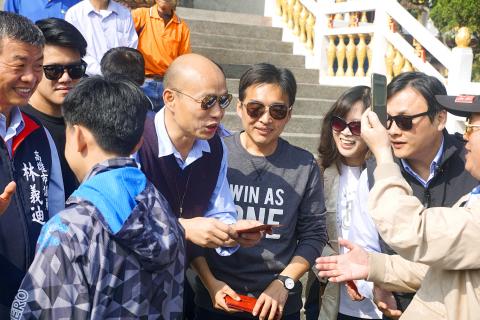Kaohsiung Mayor Han Kuo-yu (韓國瑜) yesterday downplayed growing calls within the Chinese Nationalist Party (KMT) for him to run for president next year, urging the public “not to think too much” during the Lunar New Year holiday.
Han on Nov. 24 last year became the first KMT candidate to win the Kaohsiung mayoral election in 20 years after a meteoric rise to fame.
“Do not ask me if I am going to run for president,” Han said yesterday as he visited a temple in the city. “Let’s just enjoy the holiday and not think too much.”

Photo: Huang Chia-lin, Taipei Times
Boosting the city’s economy is his priority at the moment, Han said, adding that he has seen signs of improvement and increased happiness among Kaohsiung residents.
In light of the KMT’s regained public support, senior KMT members including former New Taipei City mayor Eric Chu (朱立倫), KMT Legislator Wang Jin-pyng (王金平), KMT Chairman Wu Den-yih (吳敦義) and former president Ma Ying-jeou (馬英九) have expressed their intent or are rumored to be planning to run for president.
In light of the potentially fierce competition, former KMT Central Policy Committee director Alex Tsai (蔡正元) on Thursday proposed that party headquarters, as a rule, only nominates candidates who command higher or similar support ratings to Han’s in opinion polls.
Asked about Tsai’s proposal in an interview on Friday, Wu said that he has asked a KMT think tank to evaluate the matter, and suggest a date and procedure for the presidential primary.
“He has my blessing, whether he plans to improve his city or serve the entire nation,” Wu said when asked about the calls for Han to run.
Asked the same question yesterday, Chu said that making Taiwan a better place is what motivated him to enter politics.
“The most important goal for 2020 is not personal victory, but rather a victory for the entire KMT,” said Chu, who announced a presidential bid after completing his second term as mayor in December.
Ma yesterday also responded positively to the growing support for Han.
“It would certainly be nice if he is willing to run,” he said.
Additional reporting by Wang Chun-Chieh and Wu Chun-feng

A preclearance service to facilitate entry for people traveling to select airports in Japan would be available from Thursday next week to Feb. 25 at Taiwan Taoyuan International Airport, Taoyuan International Airport Corp (TIAC) said on Tuesday. The service was first made available to Taiwanese travelers throughout the winter vacation of 2024 and during the Lunar New Year holiday. In addition to flights to the Japanese cities of Hakodate, Asahikawa, Akita, Sendai, Niigata, Okayama, Takamatsu, Kumamoto and Kagoshima, the service would be available to travelers to Kobe and Oita. The service can be accessed by passengers of 15 flight routes operated by

Alain Robert, known as the "French Spider-Man," praised Alex Honnold as exceptionally well-prepared after the US climber completed a free solo ascent of Taipei 101 yesterday. Robert said Honnold's ascent of the 508m-tall skyscraper in just more than one-and-a-half hours without using safety ropes or equipment was a remarkable achievement. "This is my life," he said in an interview conducted in French, adding that he liked the feeling of being "on the edge of danger." The 63-year-old Frenchman climbed Taipei 101 using ropes in December 2004, taking about four hours to reach the top. On a one-to-10 scale of difficulty, Robert said Taipei 101

Taiwanese and US defense groups are collaborating to introduce deployable, semi-autonomous manufacturing systems for drones and components in a boost to the nation’s supply chain resilience. Taiwan’s G-Tech Optroelectronics Corp subsidiary GTOC and the US’ Aerkomm Inc on Friday announced an agreement with fellow US-based Firestorm Lab to adopt the latter’s xCell, a technology featuring 3D printers fitted in 6.1m container units. The systems enable aerial platforms and parts to be produced in high volumes from dispersed nodes capable of rapid redeployment, to minimize the risk of enemy strikes and to meet field requirements, they said. Firestorm chief technology officer Ian Muceus said

MORE FALL: An investigation into one of Xi’s key cronies, part of a broader ‘anti-corruption’ drive, indicates that he might have a deep distrust in the military, an expert said China’s latest military purge underscores systemic risks in its shift from collective leadership to sole rule under Chinese President Xi Jinping (習近平), and could disrupt its chain of command and military capabilities, a national security official said yesterday. If decisionmaking within the Chinese Communist Party has become “irrational” under one-man rule, the Taiwan Strait and the regional situation must be approached with extreme caution, given unforeseen risks, they added. The anonymous official made the remarks as China’s Central Military Commission Vice Chairman Zhang Youxia (張又俠) and Joint Staff Department Chief of Staff Liu Zhenli (劉振立) were reportedly being investigated for suspected “serious